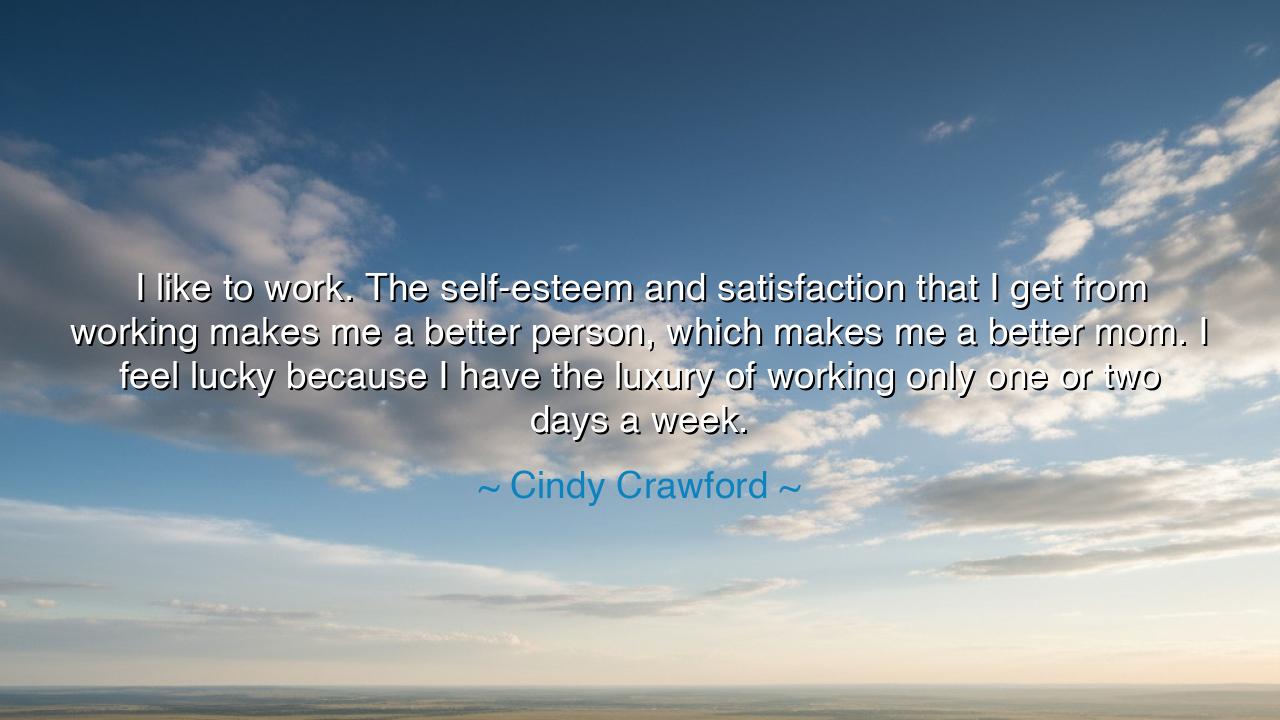
I like to work. The self-esteem and satisfaction that I get from
I like to work. The self-esteem and satisfaction that I get from working makes me a better person, which makes me a better mom. I feel lucky because I have the luxury of working only one or two days a week.






Listen, children of reflection, to the words of Cindy Crawford, who shares: "I like to work. The self-esteem and satisfaction that I get from working makes me a better person, which makes me a better mom. I feel lucky because I have the luxury of working only one or two days a week." In these words is revealed a timeless truth: the pursuit of one’s vocation is not merely an act of earning or performing—it is an act of self-realization, a cultivation of the inner being that flows outward into every relationship we hold. Work, when engaged with presence and dedication, shapes the character, just as the potter shapes clay upon the wheel.
Since antiquity, the philosophers have extolled the virtue of purposeful activity. Aristotle taught that the life of meaning is built upon action, that through effort we achieve excellence and in turn refine the soul. Cindy Crawford’s insight mirrors this wisdom: her labor does not detract from her life as a mother, but rather enriches it. Through self-esteem gained in her professional endeavors, she fortifies her ability to give love, attention, and patience to her children, embodying the truth that personal fulfillment begets relational fulfillment.
Consider the life of Benjamin Franklin, who, though immersed in civic duties and inventions, found that his disciplined work habits and pursuit of personal mastery allowed him to contribute more profoundly to his family and society. Like Crawford, he understood that satisfaction in one’s work does not compete with familial duties; rather, it empowers the individual to be a more present, more patient, and more inspired caretaker. The interplay of personal growth and social responsibility is as old as civilization itself.
The quote also reflects upon the role of fortune and privilege. Crawford acknowledges her luck in having the luxury of limited workdays—a reminder that not all are granted such balance. Yet, the principle holds universally: whatever the nature or quantity of one’s labor, the intentional cultivation of self through work nourishes the soul and strengthens one’s capacity for love, care, and moral action. The ancients would recognize this as the cultivation of virtue, a harmony between duty and self-realization.
Her words teach us that work is not merely a means to an end, but a crucible for personal development. It is through engagement with tasks, challenges, and creative endeavors that one discovers the limits of patience, the depths of ingenuity, and the resilience of character. By becoming a better person, the ripple effect touches all who depend upon us—family, friends, and community—demonstrating the interdependence of self-care and caregiving.
Practical lessons emerge from this reflection. Seek work that aligns with your strengths and passions, for it will nourish the spirit as well as the body. Honor the time dedicated to labor, recognizing that even modest contributions cultivate self-esteem and satisfaction. Balance work with family and personal life intentionally, understanding that presence in one domain enhances presence in the other. Record achievements and reflect on the growth derived from effort, as a means of recognizing the invisible fruits of labor.
Moreover, act with gratitude for any luxury or privilege that allows you to navigate work and home life with freedom and choice. Embrace the understanding that such fortune is a platform for deliberate action, not mere leisure. Whether your work occupies a day or many, approach it as a source of enrichment, shaping both your character and your ability to give fully to those who rely upon you. In this way, labor becomes a conduit of love as much as of production.
Remember, children of the ages, that the cultivation of the self through work is both a gift and a responsibility. As Cindy Crawford teaches, the self-esteem and satisfaction gained from meaningful labor flow outward, fortifying one’s role as a parent, partner, and human being. Let work be embraced not as obligation alone, but as a sacred opportunity to grow, to nurture, and to enhance the lives of all those around you. In this lies the profound harmony of action, purpose, and love.






AAdministratorAdministrator
Welcome, honored guests. Please leave a comment, we will respond soon